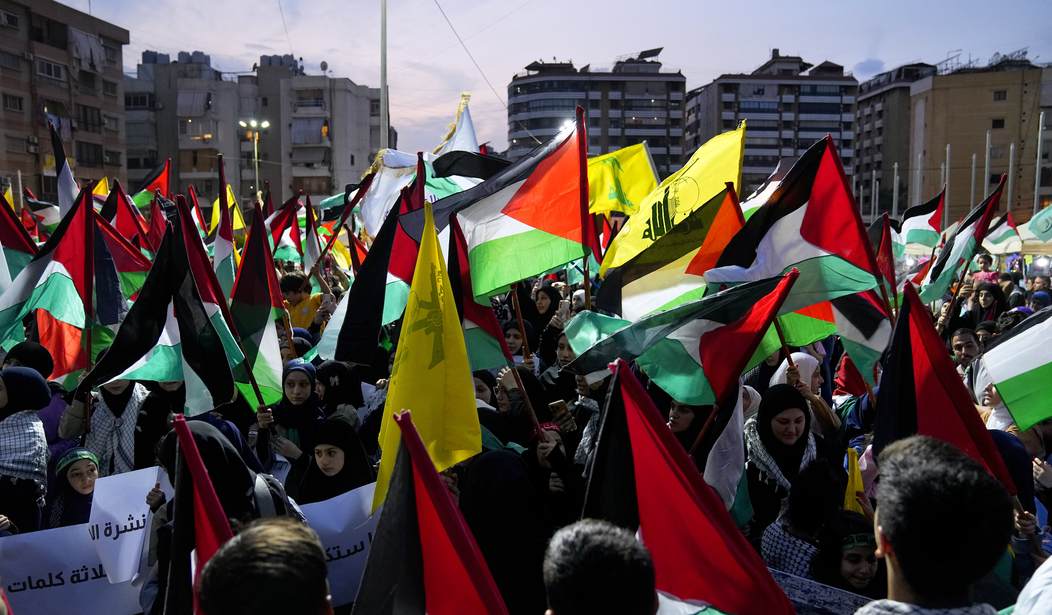Hamas Leader Claims Iran Has Placed Missiles in Strategic Locations to Target Israel 'if Necessary'
A new revelation amidst the escalating military conflict between Israel and Hamas could potentially introduce another complication to the situation in the Middle East. Iran, which is believed to have helped Hamas plan and execute its assault on Israel, is possibly preparing to expand its role in the ongoing war.
A Hamas official told a Lebanese news outlet that Iran had positioned missiles in various locations for the purpose of targeting Israel “if necessary.” This revelation comes amid increasing U.S. military presence in the region and Israel’s ground invasion of the Gaza Strip, the territory Hamas controls.
Against the backdrop of the possibility that the Hamas-Israel war will spread to additional fronts, on October 13, 2023 a Hamas official told the Lebanese Al-Jumhuriya daily that at the same time as the U.S. sent an aircraft carrier strike group to the Middle East, Iran had transferred long-range missiles to "several locations" for the purpose of targeting Israel if necessary. He did not give details about where the missiles were now located.
The official assessed that an Israeli ground operation in the Gaza Strip would lead to an escalation in the war and to additional resistance axis elements, including Hizbullah, joining it. He said that Hizbullah was on alert and that its elite Radwan Unit is ready to invade Israeli towns in northern Israel as soon as Hizbullah Secretary-General Hassan Nasrallah gives the order.
The gravity of this situation is magnified by the intensifying war in Israel and Gaza. Some fear the ground incursion by the Israel Defense Forces (IDF) might elicit a fierce reaction from Israel’s enemies – especially Hezbollah, which has been engaging in skirmishes with the IDF. The group’s leadership indicated that it might be willing to escalate its involvement in the bloody war, which has already claimed over 3,000 lives.
The news is particularly disturbing as it was also revealed earlier this month that Iran had delivered advanced weapons to Hezbollah.
Iran has supported Hamas since the terrorist group was founded in the 1980s. The regime’s involvement in the current crisis has been well-established, despite Tehran’s repeated denials. It was revealed recently that its officials met with Hamas and Hezbollah leaders to plan attacks on Israel.
Hezbollah leader Hassan Nasrallah met with a group of Iranian officials earlier this year according to a New York Times exclusive report. The revelation underscores the circumstances surrounding the current war between Israel and Hamas, which ignited after the terrorist group that governs the Gaza Strip launched a surprise attack against the Jewish nation.
Iran has a long history of training and arming proxy militia groups in the region, from Gaza to Lebanon, Iraq and Syria. It supports Hamas militarily and has helped it design and produce a domestic missile and rocket system to match the capabilities and material available in Gaza — an impoverished, densely populated coastal strip that has been blockaded by Israel and Egypt for the past 16 years.
And over the past year, there have been signs that Iran and its proxies were preparing to take a more aggressive approach toward Israel.
Gen. Esmail Ghaani, who is in charge of supervising Iran’s network of proxy militias as head of the country’s paramilitary Quds Force, repeatedly traveled to Lebanon for covert sessions with leaders of Hamas and Hezbollah, a Shiite Lebanese militia that Iran also supports.
Moreover, Iran’s government recently indicated that it would get involved if Israel were to launch a ground assault in the Gaza Strip. Iranian Foreign Minister Hossein Amir-Abdollahian met with the United Nations envoy to the Middle East Tor Wennesland on Saturday and communicated Tehran’s position on the matter. If it is true that Iran has placed missiles in various locations with the intention of attacking Israel, it would undoubtedly exacerbate an already precarious situation in the Middle East – especially if Hezbollah does start participating more in the fighting.





Post a Comment